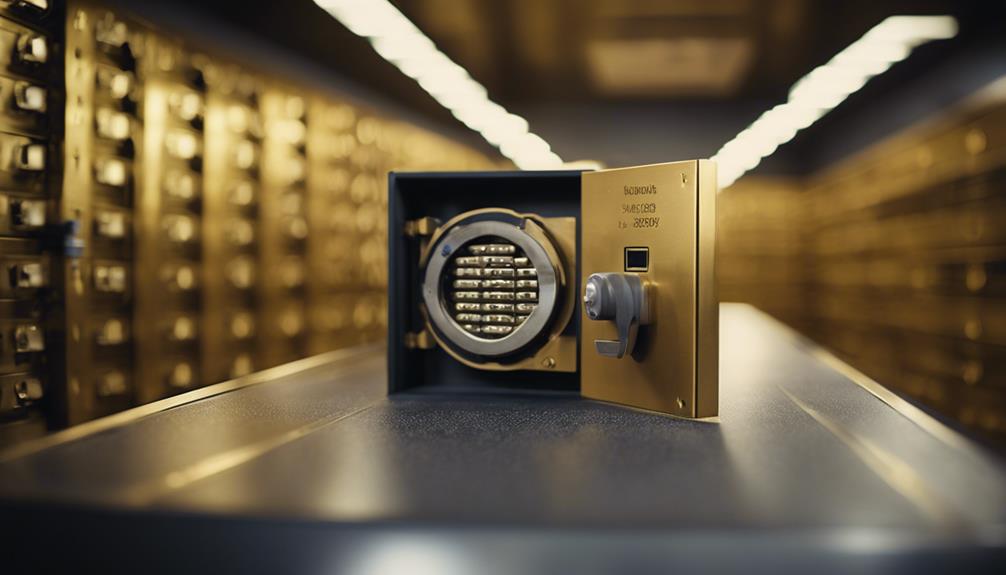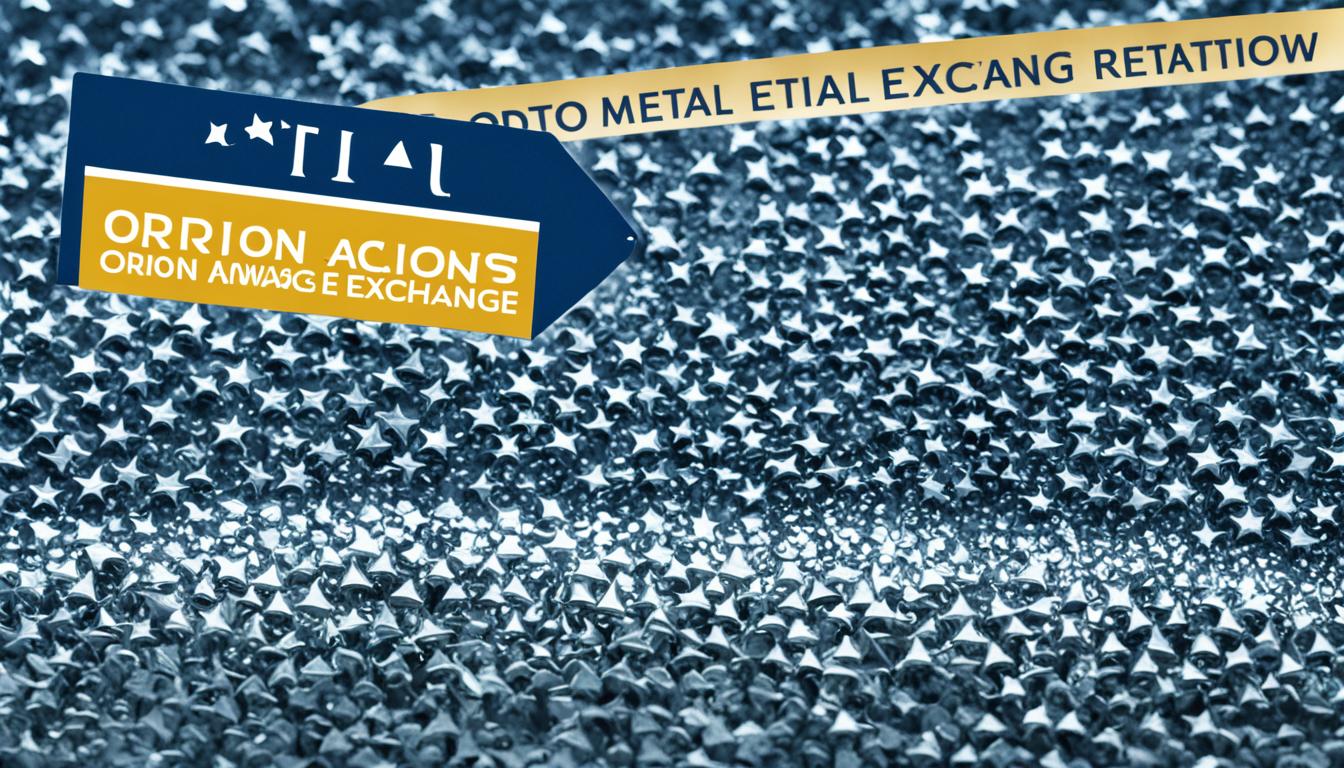In Gold IRA storage, compliance and security are essential to safeguard your retirement funds. To ensure IRS guidelines are met, opt for IRS-approved precious metals such as gold, silver, platinum, and palladium that meet specific purity standards. Choose a trustworthy custodian who follows IRS storage regulations and provides secure storage solutions. Review insurance coverage offered by depositories to understand limitations and confirm IRS compliance. Implement strict security measures to reduce fraud and theft risks. Failure to comply could result in legal repercussions, highlighting the significance of adhering to IRS rules. By adhering to best practices and regulatory guidelines, you can effectively protect your assets.
Key Takeaways
- Choose IRS-approved precious metals like gold for compliance.
- Select secure custodians adhering to IRS storage regulations.
- Ensure adequate insurance coverage for gold IRA storage.
- Implement fraud prevention measures with secure storage solutions.
- Comply with IRS guidelines to avoid legal implications and protect retirement savings.
IRS-Approved Precious Metals for Gold IRAs

When considering IRS-approved precious metals for Gold IRAs, it is vital to understand the purity standards set by the IRS for each metal. Gold, to be eligible for inclusion in a Gold IRA, must have a purity of at least 99.5%.
Similarly, silver needs to meet a purity standard of 99.9%, while platinum and palladium must have a purity level of 99.95% to be considered IRS-approved precious metals for Gold IRAs.
It is important for investors to confirm that the precious metals they choose for their Gold IRAs comply with these purity standards to avoid any IRS penalties or disqualification of their accounts.
Metals such as copper or nickel do not meet the IRS requirements for approval in Gold IRAs, underscoring the importance of selecting the right precious metal for compliance and eligibility.
Working closely with reputable IRA custodians can help investors navigate the complexities of IRS-approved precious metals and ensure the security and storage of their investments in Gold IRAs.
Secure Custodian Selection Criteria

In order to guarantee the safeguarding and proper management of assets within a Gold IRA, careful consideration of secure custodian selection criteria is paramount.
When selecting Gold IRA custodians, factors such as security measures, storage facilities, and regulatory compliance play an important role. It is essential to choose a custodian with a solid reputation and experience in handling precious metals investments.
Evaluating custodial fees, customer service quality, and accessibility are also significant aspects to take into account. Compliance with IRS regulations regarding the storage and handling of precious metals is a key factor to make sure that the custodian operates within the legal framework.
A reliable custodian's responsibilities include managing transactions, securely storing gold, and ensuring adherence to regulatory guidelines. By thoroughly reviewing these criteria, investors can entrust their Gold IRA assets to a custodian that meets high standards of security, compliance, and reliability.
Insurance Coverage for Gold IRA Storage

When evaluating gold IRA storage, it is important to assess the insurance coverage provided by IRS-approved depositories. Insurance safeguards against potential risks such as theft, loss, or damage to the precious metals held in storage facilities.
Understanding the coverage limits and insurance considerations is vital for ensuring the protection of IRA assets in unforeseen circumstances.
Insurance Considerations
Given the intrinsic value and vulnerability of precious metals, ensuring adequate insurance coverage for Gold IRA storage is paramount for safeguarding investors' assets. Custodians of Gold IRA storage facilities must adhere to robust security measures and maintain thorough insurance coverage to protect investors' physical gold investments.
These insurance policies are designed to comply with IRS regulations and provide coverage against potential risks such as theft, loss, or damage to the stored precious metals. The level of insurance coverage can vary depending on the value and quantity of gold being stored, with IRS-approved depositories playing an essential role in ensuring that the insurance in place adequately protects investors' assets from unforeseen circumstances.
Coverage Limits
Insurance coverage limits for Gold IRA storage play an important role in safeguarding investors' assets against potential risks such as theft, loss, or damage to the stored precious metals. Typically, IRS-approved depositories offer insurance coverage of up to $500,000 per account holder. This coverage provides protection in case of any unfortunate events that may compromise the security of the stored gold. It is essential for investors to understand the coverage limits provided by different approved storage facilities, as these limits can vary. Having insurance coverage adds an extra layer of security and protection, giving investors peace of mind knowing that their investments are safeguarded against unforeseen circumstances.
| Aspect | Details |
|---|---|
| Insurance Coverage | Up to $500,000 per account holder |
| Risks Covered | Theft, Loss, Damage |
| Provider | IRS-approved depositories |
Preventing Fraud and Theft Risks

How can gold IRA storage in approved depositories effectively prevent fraud and theft risks while ensuring compliance with IRS regulations?
Gold IRA storage facilities approved by the IRS play an essential role in safeguarding investors' assets. By adhering to IRS guidelines, these facilities implement stringent security measures such as 24/7 surveillance and biometric access controls to protect against theft risks.
Selecting reputable custodians with secure storage solutions is necessary in preventing fraudulent activities and ensuring the safety of IRA assets. Compliance with IRS regulations not only mitigates theft risks but also helps in shielding investors from potential losses.
These secure storage options not only deter fraudulent activities but also provide peace of mind to investors, knowing that their gold IRA investments are protected in a safe and compliant manner.
Legal Implications of Non-Compliance

Non-compliance with IRS storage regulations for Gold IRAs carries significant risks, including penalties and potential loss of tax benefits.
Failure to adhere to approved custodial storage can result in the disqualification of the IRA, leading to tax liabilities and possible audits.
Ensuring adherence to legal requirements is essential to safeguard the integrity of one's Gold IRA and protect their retirement savings.
Non-Compliance Risks Explained
Failure to comply with IRS storage regulations regarding Gold IRA accounts can have severe legal consequences for investors. Non-compliance risks include penalties, taxes, and the loss of tax benefits.
Storing gold in non-approved depositories can lead to adverse consequences, such as audits, fines, and potential liquidation of IRA assets. Investors must adhere to IRS guidelines to avoid these legal implications.
Failure to meet storage requirements can result in the disqualification of the Gold IRA, impacting the investor's financial standing. Understanding and following the regulations set forth by the IRS is essential to maintaining compliance and security in Gold IRA storage.
Consequences of Non-Compliance
In considering the repercussions of not adhering to IRS storage regulations for Gold IRA accounts, investors must be mindful of the potential legal ramifications that can impact their financial well-being and retirement planning. Non-compliance with these regulations can lead to penalties, potential disqualification of the Gold IRA, and legal implications such as tax consequences.
Storing gold in non-approved depositories as per IRS guidelines may result in regulatory scrutiny, jeopardizing the tax benefits associated with Gold IRAs and impacting retirement savings. Adhering to IRS storage requirements is essential to avoid these legal repercussions, maintain the integrity of the investment, and safeguard the preservation of tax-advantaged status.
It is important for investors to follow the prescribed storage guidelines to safeguard their assets and financial future.
Importance of Compliance
Adhering to IRS storage regulations for Gold IRA accounts is paramount for investors seeking to maintain the tax-advantaged status of their retirement savings and avoid potential legal repercussions. Non-compliance with IRS regulations on secure storage can lead to severe penalties, including disqualification of the IRA, tax consequences, fines, audits, and even the potential loss of retirement savings.
It is essential for individuals to understand that violating these storage guidelines not only jeopardizes their financial security but also risks facing legal actions that could have a profound impact on their future retirement plans. Ensuring compliance with IRS rules for Gold IRA storage is vital for safeguarding assets, protecting investments, and upholding the integrity of retirement accounts.
Best Practices for Gold IRA Management

Implementing best practices in Gold IRA management is crucial for guaranteeing compliance with IRS regulations and safeguarding the security of precious metal investments. To effectively manage a Gold IRA, consider the following key practices:
- Select IRS-Approved Storage Solutions: Choose storage options that adhere to IRS guidelines to ensure the security and integrity of your Gold IRA assets.
- Work with Reputable Custodians: Entrust your Gold IRA assets to experienced custodians who understand the importance of compliance and security measures.
- Stay Updated on Rollover Rules and Documentation: Maintain compliance by adhering to rollover rules, keeping accurate documentation, and meeting required timelines for transactions.
Regulatory Compliance and Reporting Guidelines

To guarantee the compliance and integrity of a Gold IRA, understanding and adhering to regulatory compliance and reporting guidelines is essential. Annual reporting requirements for Gold IRAs involve filing Form 1099-R for distributions and Form 5498 for contributions.
Custodians must meet insurance and auditing standards to uphold the security and protection of IRA assets. Selecting a reputable custodian that complies with IRS regulations is vital for maintaining IRS compliance and safeguarding investments. It is important to avoid rollover scams and fraudulent practices to protect against financial losses and maintain the tax-advantaged status of the Gold IRA.
Compliance with IRS regulations is necessary to avoid penalties and ensure the long-term tax benefits associated with a Gold IRA. By following these regulatory compliance and reporting guidelines, investors can secure their Gold IRAs and uphold the necessary standards for a successful retirement investment strategy.
Frequently Asked Questions
Where Can I Store My Gold Ira?
When considering storage options for your gold IRA, it's important to adhere to IRS guidelines by utilizing approved depositories. Home storage is not permissible.
Trusted partners like A-M Global Logistics offer secure solutions for storing your assets while ensuring you maintain control over your precious metals.
Seeking expert guidance from entities like U.S. Money Reserve can further assist in complying with storage regulations, ensuring your investments are safeguarded appropriately.
Are Gold Backed IRAS Safe?
Gold-backed IRAs are generally considered safe investments due to the stability and intrinsic value of physical gold.
Investors view them as a hedge against economic uncertainties, offering protection against inflation and currency devaluation.
Gold's historical track record as a store of value further enhances the safety profile of these IRAs, making them a popular choice for those seeking security, reliability, and long-term wealth preservation.
How Much Are Gold IRA Storage Fees?
Gold IRA storage fees typically range from $100 to $300 annually, representing 0.5% to 1% of the gold's value in the account. Segregated storage options may incur higher fees than non-segregated options.
It is essential for investors to align storage costs with their overall investment strategy. IRS-approved depositories offer various storage options with associated costs, and choosing the right storage solution should be based on individual financial objectives and preferences.
How Do I Hold Gold in My Ira?
To hold gold in your IRA, you must open a self-directed IRA account with a custodian that allows for alternative investments like precious metals.
The gold must be purchased through the IRA custodian and stored in an approved depository to comply with IRS regulations. Home storage of gold in an IRA is not allowed.
How Can I Ensure Compliance and Security with Gold IRA Storage?
When it comes to ensuring compliance and security with gold IRA storage, it is crucial to stay updated on the latest gold IRA regulations compliance. Working with reputable custodians and depositories that strictly adhere to these regulations can provide peace of mind and protect your investment for the long term.
Conclusion
To sum up, ensuring compliance and security in gold IRA storage is vital for safeguarding investments. Just as a sturdy vault protects valuable treasures, a secure custodian and insurance coverage shield precious metals from risks.
By following best practices and adhering to regulatory guidelines, investors can navigate the complexities of gold IRA management with confidence, like a well-orchestrated symphony harmonizing different elements for a successful performance.










